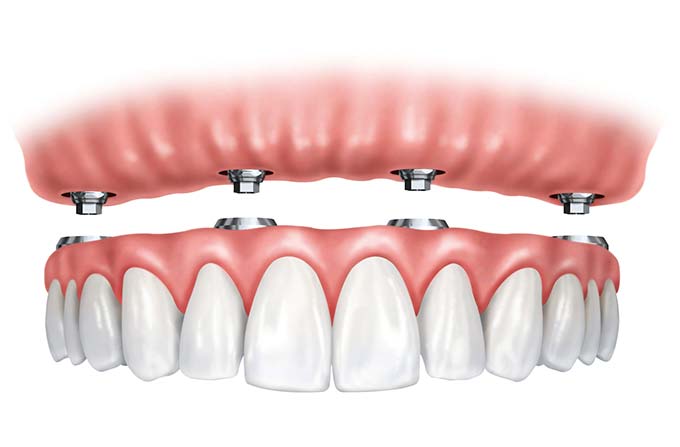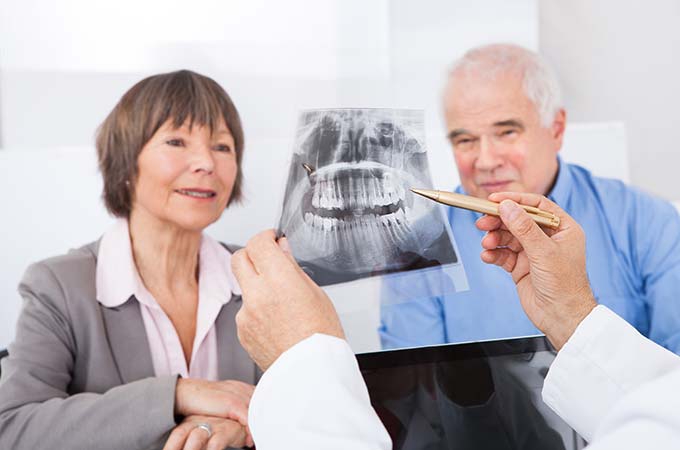FAQs
Learning about Single and Full-Arch Dental Implants
What are dental implants?
Dental implants are the most natural way to replace missing teeth. Typically made of titanium or zirconia, dental implants are designed to replace the root structure of missing teeth, providing support and stability for replacement teeth. They are the longest-lasting solution available.
What does “All-on-4” mean?
All-on-4® is a trademarked treatment procedure that involves replacing all missing teeth in one jaw using only 4 implants. This is also sometimes called “All-on-X” if more than 4 implants are recommended. This procedure is especially beneficial in patients who have lost a lot of bone in the back areas of the mouth.
Will insurance cover the cost of implants?
Generally, dental implants are not covered by dental insurance. However, policies do vary, and most cover a portion of the restorative procedure. Financing options are often available with competitive interest rates, and payments can be tailored to your budget.
Does getting dental implants hurt?
Although discomfort varies from person to person, most patients say it was much less discomfort than they thought it would be. During the surgical procedure, you will be given an anesthetic to feel little or no pain. When placing the implants, the doctor uses gentle techniques, and because the doctor is working in a clean environment, there is little chance for infection. If you follow all postoperative instructions and take the required antibiotics, there is minimal discomfort. All patients are given pain medications, but many don't use them.
Will I be awake during the dental implant procedure?
You’ll be comforted to know that placing an implant is more manageable than taking a tooth out. A local anesthetic is used to ensure your comfort... but suppose you’re very nervous about the surgery, in that case, we offer oral sedation which helps calm you further during the procedure. If you are interested in oral sedation, you will need to have a ride to and from your appointment.
Will there be pain after the dental implant surgery?
Immediately after the surgery and for a few days, you will likely experience some discomfort. After all, this is a major dental procedure. However, any pain should be manageable. Discomfort may be felt in the chin, cheeks, or underneath the eyes. You may also experience bruising of the skin and gums, pain at the implant site, and minor bleeding. Painkillers, such as Ibuprofen, will be recommended.
How long does it take to complete the entire process?
The process for Fixed Implant Bridges can take 1-3 months from implant placement to final prosthesis. Implant Overdentures and single/multi-tooth implants can take 5-6 months after implants are placed to complete. If phased bone grafting are performed for any implant procedure, it could add 4-6 months to the entire procedure.
Am I Too Old For Dental Implants?
Of course not! Adults of all ages can enjoy the benefits of implants. We’ve had patients in their 90s go through this journey with us that were thrilled with the results. Dental health is closely tied to full body health. Many patients struggle through tooth pain or those that have lost their teeth are not happy with their dentures. Your diet is significantly impacted due to eating restrictions. Your confidence and happiness is impacted due to accelerated aging and face sinking from irreversible jaw deterioration. Dental implants can restore your smile, your happiness, and your confidence which is important for your wellbeing regardless of your age.
How do I care for my new teeth?
Initially, you will only use a medicated mouth rinse prescribed by the doctor. Once your mouth is healed, you will use a Waterpik to clean around the implants and under the secured denture. You will also schedule regular follow-up visits with your dentist for cleanings.
How long will dental implants last?
Implants can last many years if cared for properly. Many implants have been in place for more than 40 years.
How do I know if I am a candidate for dental implants?
Anyone healthy enough to undergo a tooth extraction is likely a suitable candidate for dental implants. However, certain conditions may complicate or prohibit implant treatment. Patients with certain complications, such as chronic diseases, heavy smoking, or alcohol abuse, may not be candidates for implants. Your doctor will determine whether or not this treatment is right for you after a complete physical exam and evaluation of your medical history.




